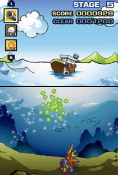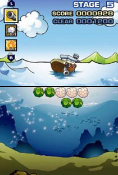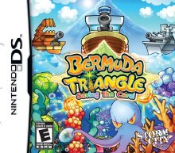Bermuda Triangle: Saving the Coral Review
|
|
See PixlBit's Review Policies

On 05/05/2010 at 07:20 PM by Jason Ross What does this game have to do with the Bermuda Triangle? |

For gamers entirely new to the puzzle genre, but without a regular internet connection or a large selection of alternate DS titles.
I'm not sure how to qualify the purpose of Bermuda Triangle: Saving the Coral. As far as I can perceive, the game's purpose is really Coral Reef awareness, but the methods Bermuda Triangle uses for actual gameplay are convoluted, underselling the game's main theme and making for what could be considered a hypocritical piece of "green" propaganda.

At regular intervals throughout the game's story mode, players witness semi-educational messages about Coral Reefs. For instance, Coral Reefs are under threat and deteriorating, which is bad, because many ocean ecosystems depend on Coral Reefs for food and development. Then, the player proceeds to throw multi-colored "pods" from a boat over beds of Coral Reefs to help them grow. Lining up three or more pods of a single color will cause the pods to disappear and release minerals, simultaneously. Progression through the various game modes also increase difficulty, adding in two or three more colors of pods.
While the game initially seems to be a puzzle title, it's design forgoes many staples of the genre that allow for deep strategy. Unlike most Tetris-style replicas, there's no way to save a pod for later use and no way to see upcoming pods for pod-placement-planning. Add in random octopus events where pods are covered with ink-blots so the player can't make out their color, shark attacks that force down the current pod to a random spot in the water, and random pods being added to the bottom of the pile at the end of every turn where no pods are cleared, and it's very clear that the game goes against any attempts at planning and strategy.

Instead, for the more difficult story stages and deep into the game's marathon mode, I found I had to use items. There's a few basic items, three of which remove mineral pods, and one, an anchor, that can be used to kill sea snails. In the former case, these items are all useful in preventing pods from the coral from reaching the dead zone, which happens to be seven spaces down and features no marking, when there's no pod match to be made. In the latter case, sea snails seem to be the coral's natural enemy, and feast on freshly developed coral with a vengeance. I'm perplexed by the concept that a self-proclaimed "green" game would encourage developing coral and the killing of snails at the same time.
All-in-all, Bermuda Triangle: Saving the Coral is a shallow title with gameplay that grows old quickly. Anyone looking for a game with pro-environmental messages should look elsewhere, given the snail-based contradictions. There's a chance the title might be worthwhile for those new to puzzle-style games, but even then, internet-based games like Bejeweled offer the same simple gameplay, with more depth and at no cost to the player. Bermuda Triangle: Saving the Coral is really just a dull experience lacking the modern depth and conventions of its competitors, and likely isn't worth the investment of any gamer.










Comments